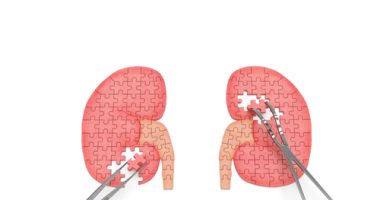Pregnant Women with Alport Syndrome Need Careful Monitoring for Kidney Decline

Pregnancy may enhance the progression of kidney failure in women with Alport syndrome — a development that, in turn, could affect the development of her fetus, according to a case study published in the journal Open Access Macedonian Journal of Medical Sciences.
In the study, “Two Pregnancies With A Different Outcome In A Patient With Alport Syndrome,” as indicated by its title, researchers reported on a patient with Alport syndrome who had one complicated pregnancy and one uneventful one, supporting the importance of pre-pregnancy counseling and frequent monitoring during and after pregnancy to women with this disease.
Alport syndrome is a genetic disease associated with chronic and progressive kidney disease due to persistent hematuria (presence of blood in the urine), and proteinuria (presence of proteins in the urine). Women are generally carriers of the type IV collagen gene mutation that leads to Alport syndrome and, although they have a milder form of the disease with slower kidney disease progression, pregnancy increases the risk of organ impairment and preeclampsia (high blood pressure that often affects kidneys).
Not many studies have been conducted on pregnant women with Alport syndrome, making it difficult to understand the impact of pregnancy in this disease and vice-versa.
Researchers followed a 27-year old patient with Alport syndrome (and a family history of the disease) with stage 1 chronic kidney disease since the beginning of her pregnancy. Her blood creatinine and proteinuria levels, as well as blood pressure levels, were within normal values at the start of being pregnant.
As her pregnancy progressed, her proteinuria worsened and blood pressure increased, accompanied by abnormally slow growth for her unborn child. She was prescribed Aldomet (500 mg initially, and then 250 mg) for the blood pressure, and a small dose of corticosteroids to stimulate lung maturation in the fetus. Despite these treatments, the baby was born during the 30th gestational week with a birthweight of 880 grams, and died one week later due to respiratory failure.
After the delivery, the patient was followed at regular intervals. Her proteinuria decreased within two months of being prescribed an angiotensin-converting enzyme inhibitor (ACEI). This medication was later substituted by an angiotensin-receptor blocker (ARB), Cozaar (25 mg/d), which further lowered her proteinuria. Blood pressure levels and blood creatinine were also normal.
Two years later, she again became pregnant, but regular checkups showed no signs of alarm, although her proteinuria increased over the course of the pregnancy. After 39 gestational weeks, she delivered a healthy baby by cesarean section. Six months after this delivery, her renal function and proteinuria levels remained normal.
“Chronic kidney disease (CKD) used to be a contraindication for pregnancy,” the researchers wrote. “It is no longer considered to be so, yet if the kidney disease is in an advanced stage, it is more difficult for a patient to conceive and have a successful pregnancy. In the management of CKD in pregnancy, it is more important to manage clinical features than to know the [origin].”
According to the authors, intrauterine growth retardation and preterm birth, as well as the risk for worsening kidney disease, occur twice as often in pregnant women with the kidney disease.
“Considering the outcomes of pregnancies in women with Alport syndrome, pre-pregnancy counseling and frequent controls during pregnancy are necessary, as well as regular monitoring after delivery,” they concluded. “Prepregnancy counselling should include information for the parents on the risk for the syndrome in the child and offered a prenatal diagnosis in the fetus.”
The researchers also recommended that “controls during pregnancy should be once monthly, once a week immediately after delivery and then once a month in the first six months, their frequency in the next period depending on the renal affection.”







Comments